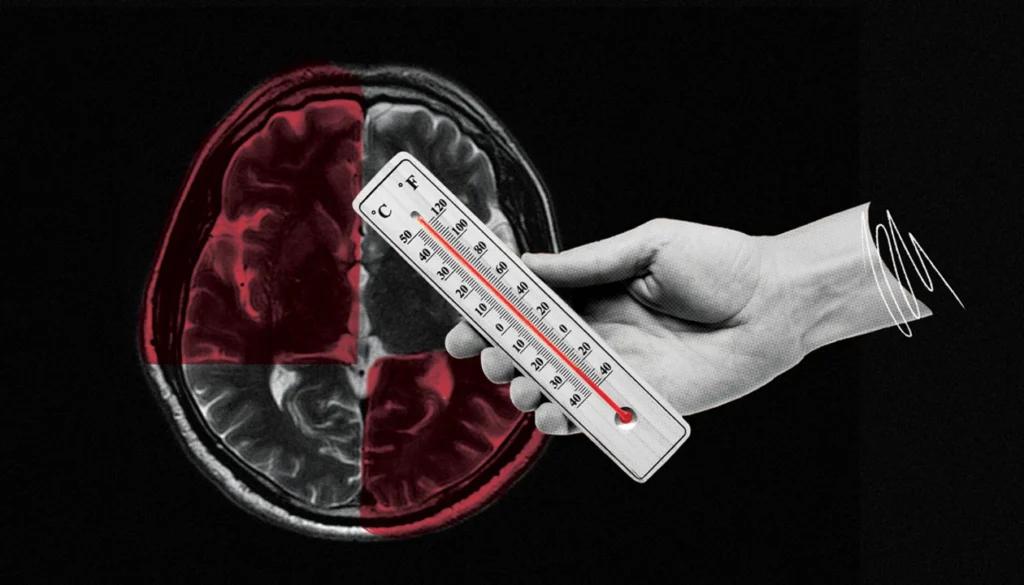As climate change drives record-breaking heatwaves, scientists are uncovering an unsettling reality: how heat affects the brain may be more serious than previously understood. From seizures and strokes to cognitive decline, mood disorders, and even impacts on fetal brain development, the effects are far-reaching and deeply concerning.
How Heat Affects the Brain: A Cognitive Crisis Unfolds
The human brain is a sensitive organ, operating optimally within a narrow temperature range. It generates heat through everyday thinking, memory recall, and sensory processing. To stay cool, it depends on proper blood circulation and thermoregulation. But in sweltering conditions, the body struggles to maintain this balance, leading to overheating.

Once the brain gets too hot, neuronal communication can become erratic. Proteins misfire, cognitive performance plummets, and decision-making suffers. Research has shown that people are more irritable, impulsive, and less able to concentrate during extreme heat events.
How Heat Triggers Brain Disorders and Neurological Symptoms
For individuals with pre-existing conditions, such as epilepsy, multiple sclerosis, stroke, or dementia, heat is more than just uncomfortable—it’s dangerous. Some medications, like antipsychotics and anti-epileptics, impair the body’s cooling mechanisms, increasing the risk of hyperthermia and seizures.
In patients with Dravet Syndrome, a rare form of epilepsy, even a mild heatwave can lead to life-threatening episodes. And those with dementia often forget to hydrate or adjust their surroundings appropriately, further heightening the danger.
Genetic Susceptibility: Why Some Brains Suffer More Than Others

Not everyone reacts the same to heat. Scientists now believe that genetic factors may play a role in how resilient—or vulnerable—our brains are to rising temperatures. Certain genetic variants may affect the structure of proteins in the brain, making some people more sensitive to thermal stress. These “thermo-latent” traits could remain hidden until environmental pressures—like global warming—bring them to the surface.
Heat and the Developing Brain: Risks for Infants and the Unborn
Extreme heat doesn’t only affect adults—it also puts developing brains at risk. Pregnant women exposed to heatwaves are more likely to experience preterm labor, which can lead to cognitive impairments and neurodevelopmental delays in their children. A 26% increase in premature births has been linked to heat exposure, a figure that’s likely to climb as global temperatures rise.
Climate and Infection: The Neuro Impact of Emerging Diseases
As warmer temperatures expand mosquito habitats, vector-borne diseases like Zika and dengue are becoming more prevalent in areas once considered safe. These viruses can cause serious neurological disorders, including microcephaly in unborn children and encephalitis in adults. Heat also weakens the blood-brain barrier, potentially increasing the brain’s exposure to toxins and infections.
Sleepless Nights and Mental Strain

Nighttime heat is particularly disruptive. Poor sleep due to elevated temperatures increases irritability, depression, and anxiety, and can exacerbate conditions like epilepsy. Hospitals report more admissions for psychiatric emergencies during hot spells, pointing to a strong connection between thermal stress and mental health.
A Widening Global Health Inequality
The neurological impacts of heat are not distributed equally. Low- and middle-income countries, already facing limited healthcare resources, are hit hardest. Older populations, individuals with disabilities, and those without access to cooling systems face disproportionate health risks. Rising heat not only threatens lives—it deepens global health disparities. how heat affects the brain.




